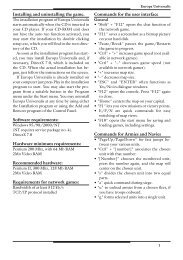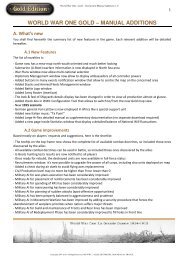Create successful ePaper yourself
Turn your PDF publications into a flip-book with our unique Google optimized e-Paper software.
27. Events and Stratagems<br />
Many events occur during the game. When they occur, a window will open<br />
to display your choices. To see what the consequences to the event will be,<br />
hold the mouse over the central answer button, and a summary will pop up.<br />
Once you have made your choice, click on the button, then on the<br />
OK button at the bottom right-hand side of the window to confirm your<br />
choice.<br />
Stratagems are secret “cards” that you can play at different crucial<br />
moments in the game (combat, diplomacy, politics, economics, etc). The<br />
cards are displayed at the bottom left-hand side of the interface, right under<br />
the region and units panel. Click on the card to see a pop-up window with<br />
the stratagem description. Confirm the proposed choice (OK button) in<br />
order to “play” the stratagem. This is usually effective as soon as played. If<br />
you refuse, the stratagem remains in your inventory.<br />
So each event is either public (historical event) or secret (stratagem). At the<br />
beginning of the game, all of the event cards are placed in a deck. Each<br />
player takes 1 to 3 events each turn, depending on the Season. During the<br />
very first turn of 1914, the number of drawn and kept events depend<br />
instead on the combination of war plans and options selected by all major<br />
nations.<br />
● When played, some events require a success roll to have an effect;<br />
otherwise it is a failure. The player must roll equal or more the<br />
difficulty value of the event.<br />
● Some events are automatic.<br />
● Some events enter in play in a certain turn.<br />
● Some events may enter in play in a certain turn and not later than a<br />
given date, so having a semi-random range of occurrence (they have<br />
a difficulty value).<br />
Important: most events may happen only if some conditions are met. To<br />
play stratagems, you are always requested to click first on one map area<br />
belonging to the playing/target nation, commonly under your control.<br />
27.1 Picking events<br />
Each turn, the number drawn varies according to the Season played:<br />
Spring-Winter: 1 event per side.<br />
● Jan/February: Germany 1, Great Britain 1<br />
● Mar/April: Austria 1, France 1<br />
● May: Germany 1, Russia 1<br />
Summer: 3 events per side.<br />
● June: Germany 2, Austria 1, France 1, Great Britain 1, Russia 1<br />
● July: Germany 2, Austria 1, France 1, Great Britain 1, Russia 1<br />
● August: Germany 2, Austria 1, France 1, Great Britain 1, Russia 1<br />
Fall: 2 events per side.<br />
162 World War One: La Grande Guerre 1914-1918<br />
● September: Germany 1, Austria 1, France 1, Russia 1<br />
● October: Germany 2, Great Britain 1, France 1<br />
● Nov-December: Germany 1, Austria 1, Great Britain 1, Russia 1<br />
27.2 Public events<br />
Public events enter in play:<br />
● if drawn from the deck, or<br />
● at a fixed date.<br />
If drawn from the deck, they have commonly a “difficulty” value: it means a<br />
die is rolled (and modified), the event occurs only if the die roll is equal or<br />
more the difficulty value. These events are called “Mandatory Events”.<br />
If the event enters in play at a fixed date, instead, a difficulty check may<br />
take place, depending on the event itself, and most times the event has a<br />
certain range of time to occur. These events are called “Historical Events”.<br />
27.3 Historical events<br />
For ease of simplicity, the historical events are grouped by nation, as<br />
follows.<br />
Austria-Hungary<br />
Death of Emperor Franz Joseph<br />
Description: The death of the old Austrian emperor will bring his son<br />
Charles to the throne. The new emperor will try to inaugurate some key<br />
reformations in the monarchy, not all of them successful for sure!<br />
Historical notes: By the time Franz Josef stepped onto the throne in 1848<br />
at the age of 18, Austria’s position as a great European power was already<br />
in serious decline. In 1867, following a series of failed constitutional<br />
reforms, the Austro-Hungarian Compromise would see Franz Josef<br />
crowned King of Hungary, establishing the Dual Monarchy of<br />
Austria-Hungary. Nearly 50 years later in 1914, with the Dual Monarchy still<br />
intact, the aging emperor had seen the Habsburg Empire lose its holdings<br />
in both Italy and Germany and was determined not to allow further decay<br />
by the loss of holdings in the Balkans to Serbia. Josef was to die in<br />
November, 1916 and his successor Karl, who reigned for just two years,<br />
would be the last of the Habsburg monarch’s.<br />
Conditions: automatic.<br />
Difficulty: die roll 6+.
















